December 15, 2007, Christchurch , New Zealand Present Conditions: Quite Balmy, nice breeze, warm (relative) drizzly weather; 22C.
Last night we returned to Christchurch from McMurdo. The C-17 that brought us back to the world north of 70 degrees south latitude included 68 other researchers and a few employees. Many of the Andrill scientists and some of their equipment came with us. We arrived in Christchurch, cleared customs and returned our cold weather gear to the distribution center and set off for our hotels.
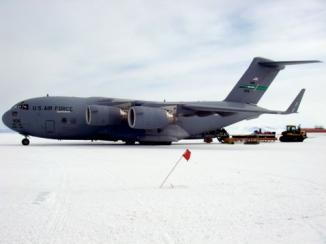
Our plane to carry us back to Christchurch
Polar Plunge!!
The night before we left Andrew, Terry, April and myself joined Addie (the diver) out at the dive hut near Armitage point to go for a polar plunge. Yes! I wanted to do this and I don’t think the others thought I really would. Some station employees showed up to go on the plunge themselves. We got the ice out of the dive hole just as they showed up so we delightfully allowed them to go first, hoping I think that they would leave before we went in. April and I waited to the very end, and I was much relieved when April said she didn’t want to go in with the others there and was hoping that it was just us girls! What a relief!! Even the PG version that we did was done with just us girls! The station employees all left and Andrew and Terry went outside. Yes it was cold! –2C!! I missed one of the steps on the ladder so my feet went in for a lot longer then initially anticipated- but down and back up I went. It was not as miserable as I anticipated but I wasn’t in for 10 seconds and it was only really hard on my head. It was cold and the cold makes your body tighten up and constricts your respiration- kind of scary but I had learned about that in diving lessons a year ago so it was anticipated. I couldn’t feel my toes for a couple of hours but it was no big deal. Now I have been in 4 out of 5 oceans. This was something I had to do, one never knows when you get the opportunity to do it again. The night was pretty uneventful after that.
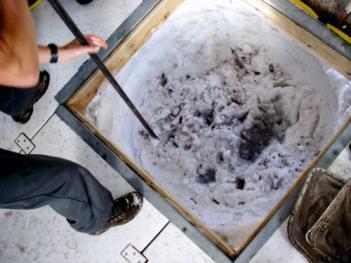
Removing the ice from the dive hole so we can go for the plunge!
And I bet you thought you were going to see pictures of us!!
We left McMurdo at 3:30 pm. We had already cleared "Antarctic” customs, and bag drag so for 16 hours we had a few things to finish up at the station and wait with eager anticipation to board the C-17 for our return flight.
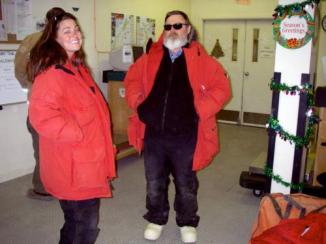
Waiting for transport to the Pegasus Ice landing field
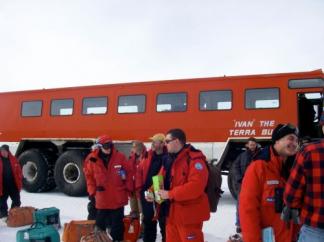
Ivan the Terra Bus- Airport transportation
Leaving Antarctica was like reading the last chapter in a book. The anticipation of the experience and what one will see as explained by others who have been there or have researched it is not the same as seeing, feeling, breathing, hearing the place for oneself. My roommate, Jules was an incredible asset to the experience and I will always value our long talks where we solved all the problems of the big world and the world of McMurdo, and her kind tolerance and hospitality of putting up with a "beeker” in basically a long term employee dorm. Jules’s experiences on the ice covers the last 28 years and began as one of the US Navy SeaBee’s before the station was turned over to the National Science Foundation. She was one of the first responders to the New Zealand Pegasus plane crash on Mt. Erebus in 1972 and has been there through tough weather, multiple station contractors and hundreds of people moving through life. Jules has seen many changes at McMurdo and in Antarctica over her years on the ice. Steve and Andrew who have had so many trips down and knew what to do to make my experience even better.
It is with silent satisfaction and deep contemplation that I leave from this unique place. I had the opportunity to experience a small part of the Antarctic environment during the summer season. The 24 hours of light was not any kind of a problem, the cold was never as miserable as I thought it would have been or potentially could have been. The sample collection was something that I had had years of experience with just not in an extreme environment. It was incredible to get to see the penguins and seals in their own world, not behind bars, plexiglas or some other controlled environment. My first helicopter ride was in Antarctica, flying maybe a 100 feet above the glacial ice below us, the breaking sea ice next to us and Mt. Erebus and Mt. Terror on each side. That was amazing!
My thoughts drift back into the relative recent history to imagine how others functioned here without the modern conveniences that we had. I wonder really how much our footprint has changed this place- is it as serene and as pristine that most people can only assume? What will increased numbers of visitors do to this place? What will continued climate change do to shift the delicate balance between the native fauna and the environment? Have we already caused an irreversible change? How can we convince the rest of the world of the need to be careful about our decisions to directly and indirectly change this environment?
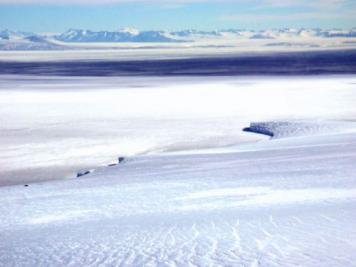
The GlacierA mass of ice that persists for many years and notably deforms and flows under the influence of gravity. meets the Sea Ice near Cape Bird
Senegalese Ecologist, Baba Dioum's words are posted on my classroom wall and as I think of the curiosities, comments and questions from my own students I can only imagine what might change for our planet if only others could benefit from the opportunity I was able to bring to my students.
These words have never meant so much to me as they do now since my experience in Antarctica.
In the end,
we will conserve only what we love;
we will love only what we understand;
and we will understand only what we have been taught.
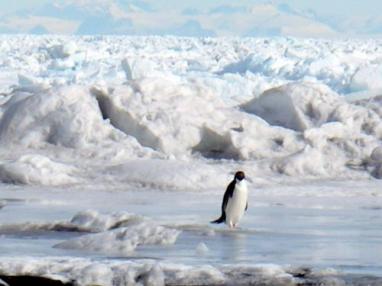
I can only hope that this little guy can continue to survive in his world
and not be lost in ours.


Comments